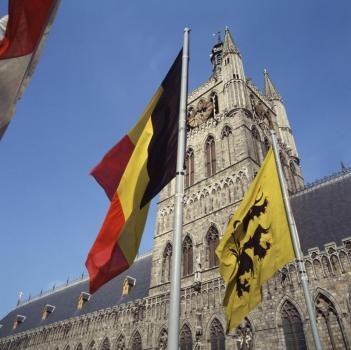vendredi, 23 avril 2010
Belgium Is Thrown Into Political Chaos
http://online.wsj.com/article/SB10001424052748704830404575199860893300400.html
Belgium Is Thrown Into Political Chaos
Premier tenders resignation, but king says no; burqa-ban vote on hold
By JOHN W. MILLER
BRUSSELS—Belgian Prime Minister Yves Leterme tendered his resignation but was rebuffed by King Albert II, throwing this fractious nation into another round of political chaos and delaying a historic vote to ban the full-face veils worn by some conservative Muslim women.
 Belgium's Prime Minister Yves Leterme leaves the Royal Palace after a meeting with King Albert II.
Belgium's Prime Minister Yves Leterme leaves the Royal Palace after a meeting with King Albert II.Belgium was set to become the first European country to forbid the practice of wearing the burqa in public. The proposed law, which has been approved in committee, has broad support in Parliament and is expected to pass when the dust settles from the current crisis.
Mr. Leterme's hand was forced Thursday morning when the Dutch-language Conservatives withdrew from his five-party coalition, leaving it without a workable majority. "We've lost confidence in the government," said Alexander De Croo, president of the Conservatives.
The crisis comes at a poor time for Belgium, just 10 weeks before the country is scheduled to take over the European Union's rotating presidency. The Belgian presidency is also a chance to showcase Herman Van Rompuy, a former Belgian prime minister and now the EU's first-ever president. Mr. Leterme, 49 years old, had been busy organizing a promotional tennis match between national stars Justine Henin and Kim Clijsters.
Belgium is also grappling with managing its economic recovery, cutting its budget deficit and dealing with the flight ban following the volcanic eruption in Iceland.
Mr. De Croo and other members of Belgium's Dutch-speaking majority charge that Mr. Leterme has offered too many concessions to Belgium's French-language minority in a technical dispute over administration of the suburbs of Brussels.
The crisis left the prime minister no choice but to submit his resignation to King Albert II. But after a Thursday afternoon meeting, the king refused. "A political crisis would be inopportune and would do serious damage to the economic and social well-being of the citizenry and to Belgium's role at the European level," Mr. Leterme and the 75-year-old monarch said in a joint statement.
The parties will hold meetings on Monday to try to find a way out of the impasse. Possibilities include Mr. Leterme finding a compromise to rebuild his coalition, the emergence of a new prime minister, or national elections. Parliament will also reconvene on Monday, but a vote on the burqa ban isn't likely until the political dust has settled.
At the heart of the dispute that forced Mr. Leterme to offer his resignation is a fight over the suburbs surrounding Brussels. A gaggle of small towns and villages numbering several hundred thousand people, these multilingual neighborhoods are in Flanders but are still tied to francophone-controlled Brussels via a common court and electoral system, thanks to a 1960s-era treaty.
Belgium's Dutch-language majority is seeking to split this area from the core of Brussels. In practice, that would force the residents of those suburbs to use Dutch-language courts, and they could vote only for politicians running for office in Flanders. Most importantly, it would be a major symbolic victory for Flemish politicians who advocate ever more autonomy for Flanders. The two language groups also fight regularly over everything from taxes and school districts to football and what to write in history books.
It is an issue that has haunted Mr. Leterme ever since his party won power in elections in 2007. It took nine months for him to forge a coalition. He has now offered his resignation five times, although he has exited power only once, over his role in a state bailout of Fortis Bank.
Mr. De Croo had been threatening for weeks to quit the government unless French-language parties gave up the Brussels suburbs. "The Flemish parties are playing Russian roulette," said Olivier Maingain, a member of the Francophone Democratic Front.
Despite the divisions, no major Belgian political party is advocating a breakup. The French-language group can't afford to lose the financial support of Flanders, one of the wealthiest regions in the world. Flemish politicians oppose a divorce because they would lose political control of Brussels, because it would cost them geopolitical capital and because it would simply be too expensive. Belgium's 97% ratio of debt to gross domestic product is the third-highest in the euro zone, behind Italy and Greece.
"Belgium is not dead, but there are increasing problems of understanding between the two sides," said Pascal Delwit, a political scientist at the Free University of Brussels.
18:25 Publié dans Actualité | Lien permanent | Commentaires (0) | Tags : belgique, crise belge, belgicana, europe, affaires européennes, politique, politique internationale |  |
|  del.icio.us |
del.icio.us |  |
|  Digg |
Digg | ![]() Facebook
Facebook



Les commentaires sont fermés.